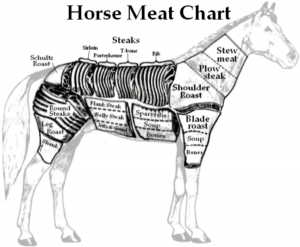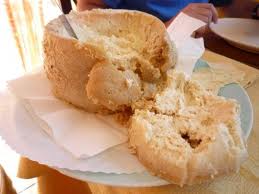In honor of the death of the mighty Maurice Sendak, whose classic book In the Night Kitchen dared to include in one of its illustrated scenes the three-year-old hero’s wee penis, thus earning a ban in various pathetic circles, today’s feature contemplates banned foods. There is nothing here as fantastic as The Adventures of Huckleberry Finn, but we can nonetheless appreciate the process of changing sensibilities, gastronomic if not linguistic.
Jesus Rode an Eeyore, Not a Trig ger
ger
You’d have a hard time finding horse on any menus in the Western world these days (though I seem to recall an article in The Times a few years back trumpeting its inclusion among the quirky dishes served by a new restaurant debuting to some fanfare.) In general, though, eating horse is taboo, just half-a-step away from eating a pooch. Eating horse was a staple, however, for early Anglo-Saxon tribes, who surely relied on the animal to win battles, make clothes, and till earth. Eating the horse was a way to honor its contribution to their human existence. Popes Zachary and Gregory III consequently banned the practice in the 8th Century as a way to help eradicate pagan religious festivals. The ban remains on the Vatican’s law books to this day, but President Obama signed into law a bill allowing the slaughter and consumption of horse meat last November.
Formaggio Fissa
 Casu Marzu has been eaten in Sardinia, Italy for thousands of years. The Sardinians consider it an aphrodisiac, and making it is easy. You simply remove the rind of a Pecorino and leave it outside so that a cheese fly (Piophila casei, to be proper) can lay her eggs inside. Once the larvae hatch, they begin to eat through the Pecorino. By the time Casu Marzu is ready to be cut into strips and spread on flatbread, thousands of translucent maggots a third-of-an-inch long will be swarming through it. Since those translucent maggots can jump up to six inches when annoyed (and let us stop for a minute to admire a creature that can leap twenty times its own height), diners hold their hands over the flatbread to keep them from launching themselves into the gastronomes’ noses or eyes. Because Casu Marzu pretty much crosses the line from fermentation into decomposition, the States and E.U. ban it. The Sardinians have rules, though, that ensure safety. A cheese in which the maggots have died is spoiled, and shouldn’t be eaten. However, if a diner simply can’t hack the larvae, they do have the option of wrapping the cheese in a paper bag. Apparently, the critters make a pattering sound like rain falling gently on a tarpaper roof as they hurl themselves at the bag while suffocating. Recently, Sardinians found a way around the E.U. ban by labeling Casu Marzu a “traditional food,” trumping health and safety with cultural prerogatives.
Casu Marzu has been eaten in Sardinia, Italy for thousands of years. The Sardinians consider it an aphrodisiac, and making it is easy. You simply remove the rind of a Pecorino and leave it outside so that a cheese fly (Piophila casei, to be proper) can lay her eggs inside. Once the larvae hatch, they begin to eat through the Pecorino. By the time Casu Marzu is ready to be cut into strips and spread on flatbread, thousands of translucent maggots a third-of-an-inch long will be swarming through it. Since those translucent maggots can jump up to six inches when annoyed (and let us stop for a minute to admire a creature that can leap twenty times its own height), diners hold their hands over the flatbread to keep them from launching themselves into the gastronomes’ noses or eyes. Because Casu Marzu pretty much crosses the line from fermentation into decomposition, the States and E.U. ban it. The Sardinians have rules, though, that ensure safety. A cheese in which the maggots have died is spoiled, and shouldn’t be eaten. However, if a diner simply can’t hack the larvae, they do have the option of wrapping the cheese in a paper bag. Apparently, the critters make a pattering sound like rain falling gently on a tarpaper roof as they hurl themselves at the bag while suffocating. Recently, Sardinians found a way around the E.U. ban by labeling Casu Marzu a “traditional food,” trumping health and safety with cultural prerogatives.
Chlori-Cluck
Pretty much all of industrialized meat production rests on a very slim profit margin, so the industry has long used chemical washes and technology to sanitize its meat at the lowest cost allowable. My favorite is the process of irradiating beef with gamma rays and x-rays; because the feedlots and sl aughterhouses are so filthy, there’s no cost-effective way to make sure all of the feces have been washed off the meat. Irradiation, however, renders the traces of poop safe for consumption. I just learned, however, that the equivalent for the chicken industry is the chlorination of the birds. Before being shipped to grocery stores, chickens are dipped in chlorine baths to kill e-coli and whatever else might be crawling around on it. The E.U. bans the import and sale of American chickens for this reason, and whenever legislators make it known they are considering lifting the ban, the population throws a fit. A few years ago Russia, that bastion of consideration of the general welfare, implemented its own ban.
aughterhouses are so filthy, there’s no cost-effective way to make sure all of the feces have been washed off the meat. Irradiation, however, renders the traces of poop safe for consumption. I just learned, however, that the equivalent for the chicken industry is the chlorination of the birds. Before being shipped to grocery stores, chickens are dipped in chlorine baths to kill e-coli and whatever else might be crawling around on it. The E.U. bans the import and sale of American chickens for this reason, and whenever legislators make it known they are considering lifting the ban, the population throws a fit. A few years ago Russia, that bastion of consideration of the general welfare, implemented its own ban.
The Green Temptation
 No, not absinth, though that is banned as well, for shame. I’m talking about asparagus. According to Barbara Kingsolver (whose research skills I’m going to trust), asparagus was banned from nunneries during the Renaissance. Obviously.
No, not absinth, though that is banned as well, for shame. I’m talking about asparagus. According to Barbara Kingsolver (whose research skills I’m going to trust), asparagus was banned from nunneries during the Renaissance. Obviously.

This post is fascinating! But not appetizing.
Simply spellbinding, Jason. I loved it. However, I’m not lining up for any of the delicacies except for asparagus!
Now, Marty, what would the nuns at St. Bridget’s say about that?